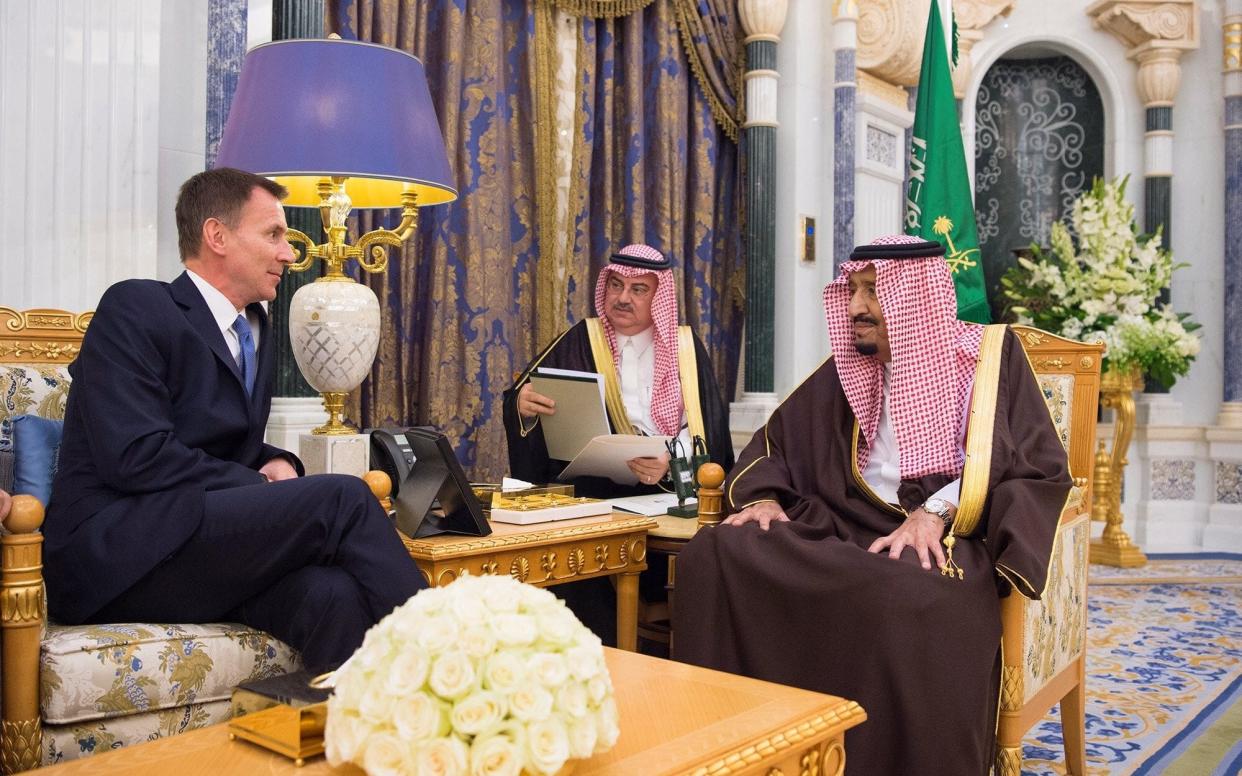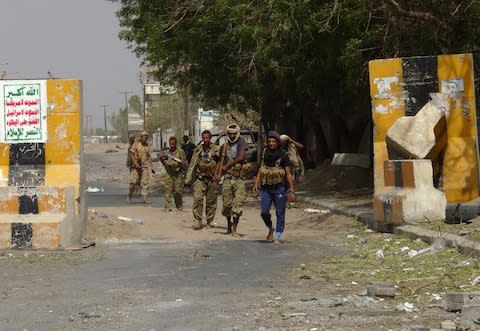Hunt urges Saudi Arabia to 'seize the moment' and end Yemen war

Saudi Arabia must "seize the moment" and bring an end to the war in Yemen, Jeremy Hunt, the foreign secretary, said Monday as he visited Riyadh to put pressure on the kingdom over the conflict and the murder of Jamal Khashoggi.
During a day of intense shuttle diplomacy, flying from Saudi Arabia to the UAE and back again before returning to London, Mr Hunt said he pushed the UK’s Arab allies to move towards a ceasefire in Yemen.
His visit came as Turkey continued to pressure Saudi Arabia over Mr Khashoggi’s death by sharing with Western countries a graphic audio tape of his final moments inside the Saudi consulate.
“We have been discussing Khashoggi but also the vital need to seize the moment in Yemen and stop famine and cholera intensifying,” Mr Hunt said.
The foreign secretary met King Salman and the Saudi foreign minister in the morning and was due to meet Mohammed bin Salman, the Saudi crown prince accused of ordering Mr Khashoggi’s murder.
He also met with Mohammed bin Zayed, the crown prince of the UAE, and raised the case of Matthew Hedges, a British academic arrested in Dubai on spying charges.

Mr Hunt’s visit to the Gulf came as fighting continued in the Yemeni port city of Hodeidah, where Saudi-led coalition forces are trying to dislodge Houthi rebel fighters backed by Iran.
At least 150 people were killed in 24 hours of fighting from Sunday, although there appeared to be a lull in the offensive while Mr Hunt was in the region.
Hodeidah is the main lifeline for food and aid for northern Yemen and the UN has warned of an "absolutely catastrophic situation" if the port is damaged during the fighting.
Around 14 million people in Yemen - half the country’s population - are on the brink of famine, according to the UN. More than 100 children are estimated to be dying each day as a result of disease and malnutrition.
While the US and the UK support the Saudi-led bombing campaign in Yemen, both countries have been pressuring Riyadh to bring an end to the disastrous four-year war.
The US and UK have called for a ceasefire by the end of November, followed swiftly by UN-brokered peace talks in Sweden. So far there is little sign that either the Houthis or the Saudi-led coalition are prepared to end the fighting.

The International Rescue Committee said Mr Hunt’s trip to the Gulf was a “welcome sign”. “Active and urgent diplomacy at the highest level is needed to stop more civilian deaths,” the group said.
Meanwhile, Justin Trudeau, the Canadian prime minister, became the first Western leader to acknowledge that his country’s intelligence services had listened to a Turkish tape of Mr Khashoggi’s murder.
Downing Street refused to say if MI6 had listened to the tape. France sparked a row with Turkey by accusing Recep Tayyip Erdogan, the Turkish president, of playing “a political game” with the audio tape.
A spokesman for Mr Erdogan called the French comments “unacceptable” and said that a French intelligence official listened to the tape on October 24 and received a transcript of its contents.
The tapes reportedly capture Mr Khashoggi being strangled to death within a few minutes of entering the Saudi consulate in Istanbul on October 2.
A coalition of aid groups called on Mr Hunt to push for "concrete measures" to address the humanitarian crisis in Yemen, including opening up access for aid and commerical goods and agreeing a plan to pay public sector salaries in Yemen.
The collapse of the economy and government budgets have left many Yemenis unable to buy food, even if it is available on the shelves.

